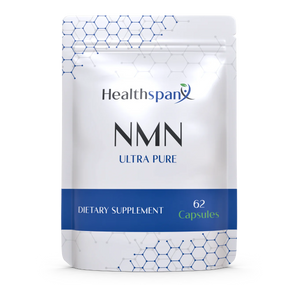Does NMN Help Lungs? Scientific Findings Explained | HealthspanX
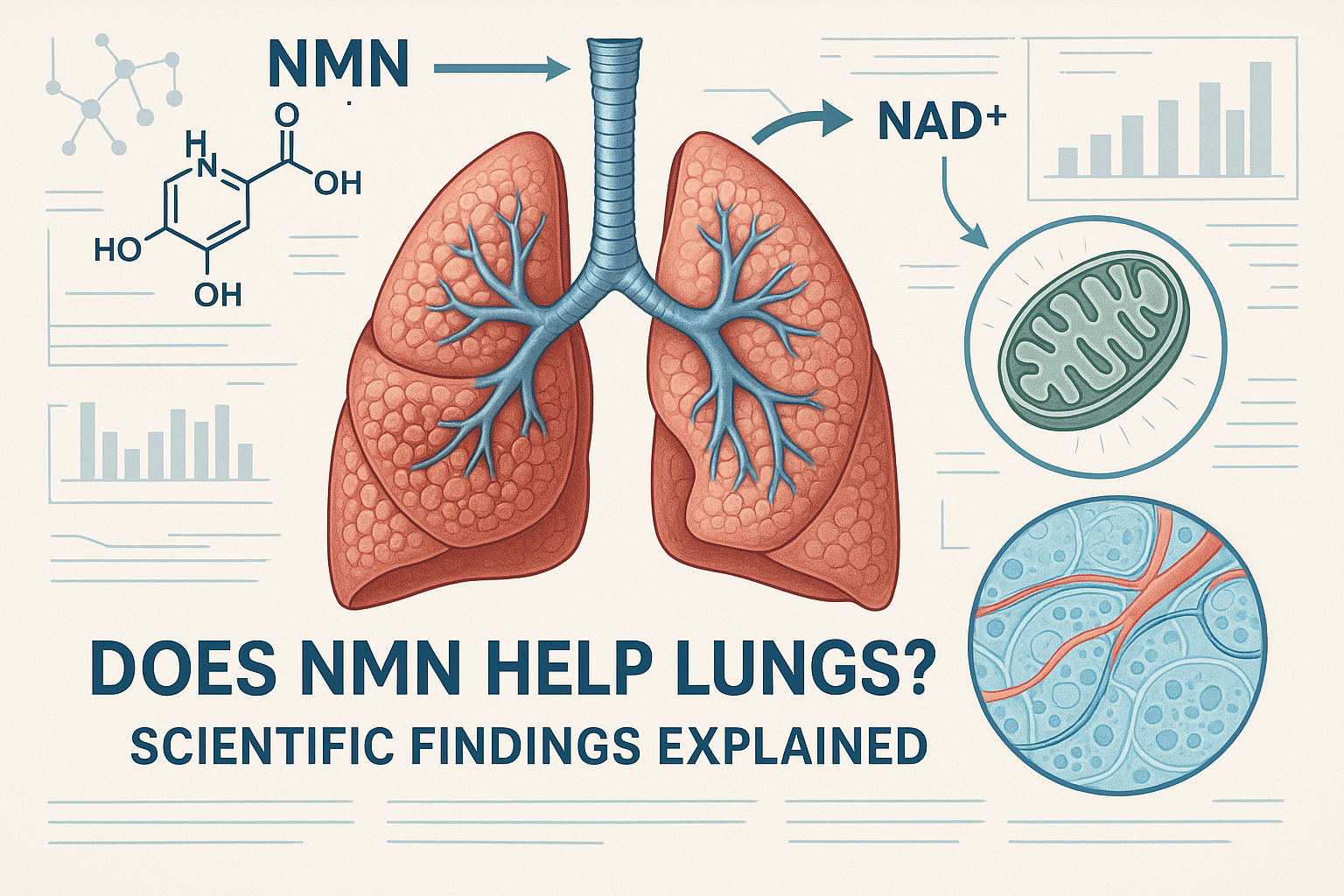
NMN Lung Health: Does NMN Help Lungs?
Yes — research suggests NMN can protect and restore lung health by reducing damage, calming inflammation, and improving the lungs’ ability to repair themselves.
If your lungs were a busy city, every breath would be like a fleet of delivery trucks bringing oxygen. Oxygen is the “packages” your cells need to run every machine in the body.
Pollution, smoking, dust, or simply getting older can cause traffic jams, broken roads, and slower repair crews. This means that your lungs can deteriorate over time, or develop an acute lung injury. Aging and environmental factors can cause cell senescence in alveolar epithelial cells, which are critical for lung function.
Epithelial cells, especially alveolar epithelial cells, play a key role in gas exchange and immune defense, and their decline impacts overall human health. However, studies show that NMN might offer some relief.
Let’s dive into the role of NMN in lung health and find out exactly how NMN may help your lungs?
What Is NMN?
NMN is a natural compound your body uses to make NAD+, an essential coenzyme for producing energy and repairing DNA.
Nicotinamide mononucleotide (NMN) plays a crucial role in supporting nicotinamide adenine dinucleotide (NAD+) levels, a molecule found in almost every living cell. NAD+ is vital for maintaining healthy cellular function, especially in lung cells.
Think of NAD+ like a rechargeable battery that powers:
-
Energy production — so your cells can do their jobs
-
DNA repair — fixing “blueprint” errors caused by toxins or aging
-
Antioxidant defenses — neutralizing harmful molecules that damage cells
-
Supporting autophagy and reducing cellular senescence in lung cells — helping prevent the buildup of senescent lung cells and maintaining lung function
-
Epigenetic regulation — an additional layer of control over your genes
As we age, NAD+ levels drop — like a phone battery that cannot hold a charge any longer. And studies have shown that replenishing NAD+ levels through NMN may help alleviate some of the age-associated diseases and disorders. Thus, NMN is emerging as a promising anti-aging supplement.
How Does Lung Injury Happen?
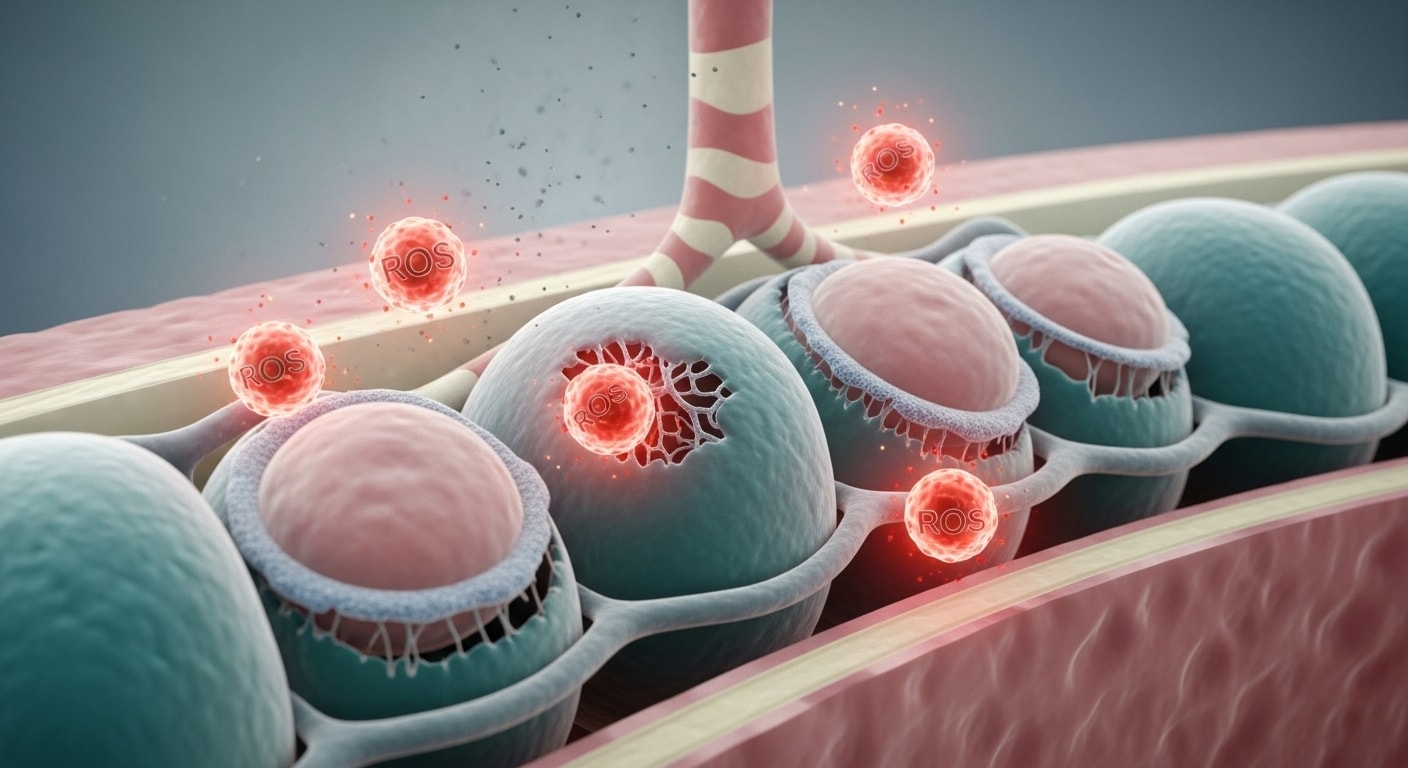
Lungs are damaged by oxidative stress, inflammation, and scarring, often from pollution, smoking, or harmful dust particles. Reactive oxygen species (ROS) and free radical biology play a key role in this process by inducing lung cell senescence and contributing to lung damage.
Your lungs can get damaged in many different ways. These include lung cancer and silicosis. Lung diseases often result from the accumulation of senescent lung cells and ongoing oxidative damage.
What Is Silicosis?
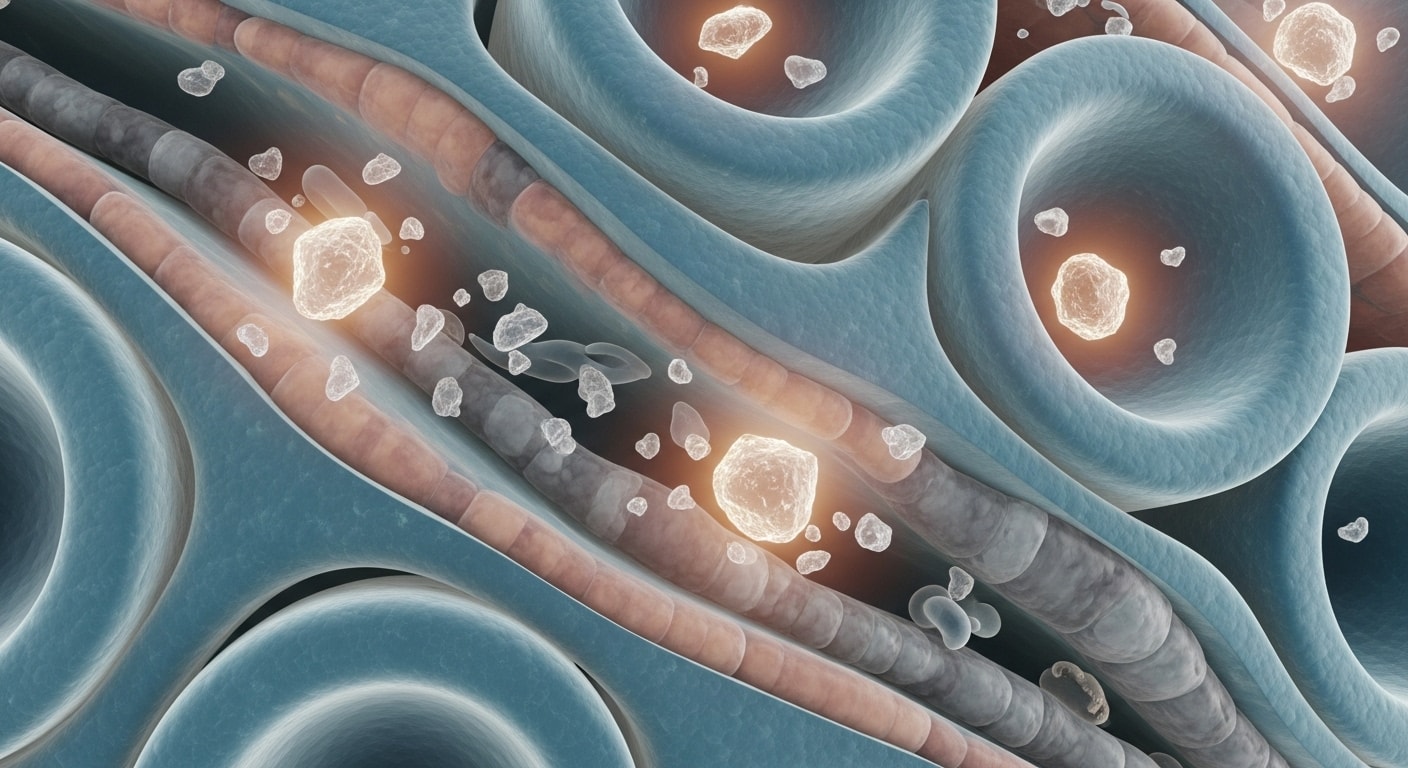
Silicosis is a nasty chronic, and often progressive, lung disease caused by inhaling fine particles of crystalline silica. They trigger inflammation, oxidative stress, and scarring.
Silicosis develops when microscopic silica dust — found in materials like sand, concrete, and stone — is inhaled and becomes lodged deep in the lungs. Once inside, these particles are nearly impossible for the body to break down or remove. They act like tiny shards of glass, irritating lung tissue every time you breathe.
Over time, this irritation triggers chronic inflammation. Chronic inflammation and cellular senescence in alveolar epithelial cells can induce pulmonary fibrosis, as the accumulation of senescent cells impairs lung repair and promotes scarring.
And inflammation leads to a progressively increasing cycle of cell damage and repair, which eventually causes fibrosis
NMN For Lung Health: The Silicosis Study
In mice with silicosis, NMN reduced scarring, oxidative stress, and inflammation by activating the Nrf2–glutathione antioxidant pathway.
In a 2023 study, scientists tested NMN in mice models of silicosis. And they found that NMN significantly reduced oxidative stress and inflammation.
If you remember, silicosis causes damage by causing inflammation which starts the cell damage that snowballs into fibrosis. Therefore, being able to reduce inflammation offers a promising way to mitigate the damage caused by inhaled silica.
Can NMN Protect Against SARS-CoV-2?
Some preclinical findings suggest that NMN supplementation may offer some protective effect against SARS-CoV-2, and even reduce the risk of death. This could be really promising for people with long-COVID or any future epidemics of SARS-CoV.
NMN may also help support healthy immune responses in the lungs, particularly through its effects on alveolar epithelial cells, which play a key role in lung barrier and immune defense functions.
Before we dive into how NMN protects against SARS-CoV-2, let’s learn more about the infamous cytokine storm - the main mechanism that’s believed to kill people infected with SARS-CoV-2.
What Is A Cytokine Storm?
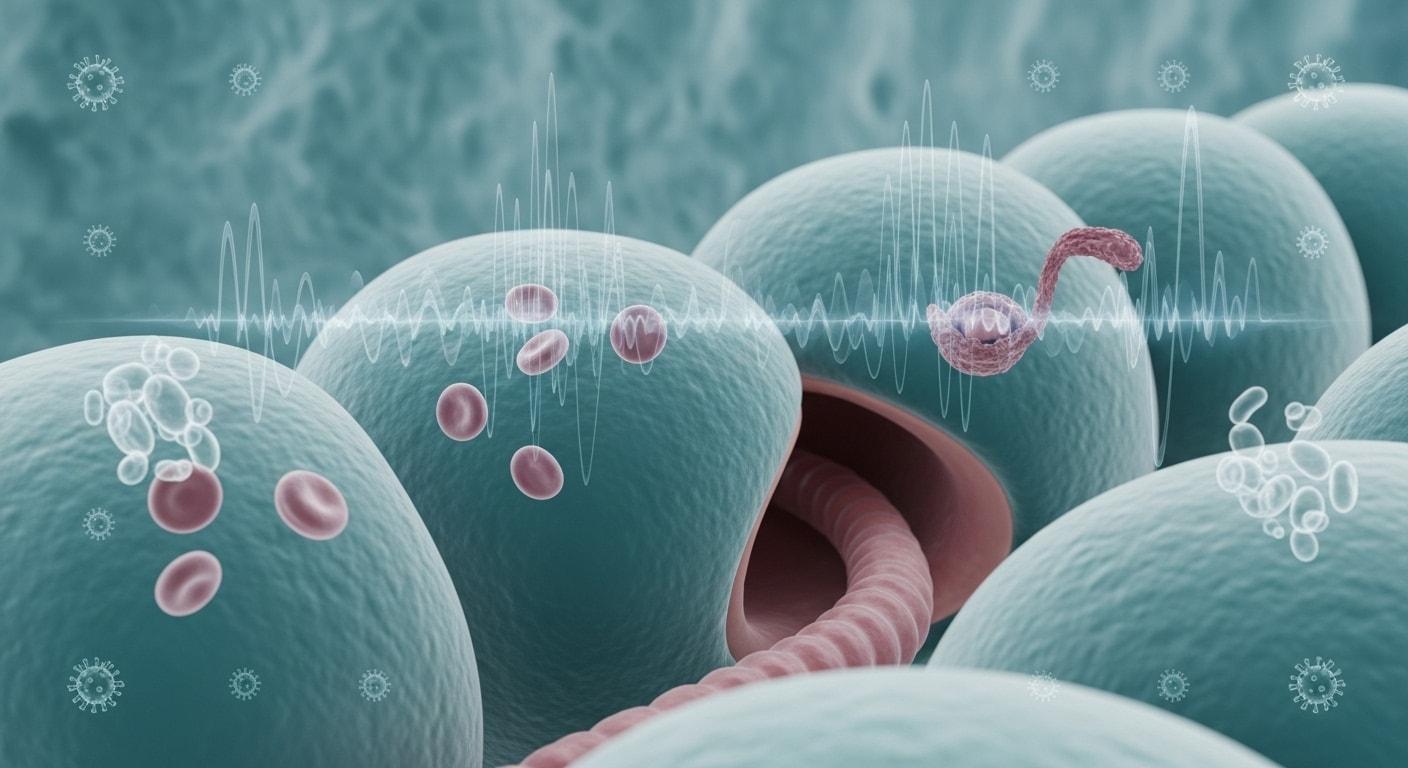
A cytokine storm is an excessive immune reaction where the body produces an overly strong inflammatory response i.e. too many inflammatory molecules (cytokines) at once, causing tissue damage and cell death.
Cytokines are small proteins that immune cells communicate. It's like text messages telling other cells where to go and what to do. Normally, they help fight infections and heal injuries. However, imagine getting spammed by thousands of texts - that's the underlying mechanism of a cytokine storm.
A cytokine storm happens when this system goes into overdrive, releasing very high levels of pro-inflammatory cytokines such as interleukins and tumor necrosis factors.
This leads to excessive inflammation which causes a lot of collateral damage. And that collateral damage may end up being severe enough to kill the person that the immune system is trying to protect.
How Does NMN Protect Against Reactive Oxygen Species And Oxidative Stress?
Scientists administered NMN to infected young mice and aged mice for 3 days. They found that it protected the mice against SARS-CoV-2-induced pneumonia and even reduced inflammation.
NMN treatment led to fewer neutrophils and macrophages (immune cells) in the lungs. This meant that the inflammation was not as bad as before. And thus, the damage from the cytokine storm was averted.
This protective effect is very significant when we compare mortality. In the control group (the group that didn't receive NMN), all mice died. However, in the group that did receive NMN supplementation, the survival significantly increased to about 30% mice!
It may not be a huge number, but let's put it in perspective. According to WHO, over 7 million people have died from COVID so far. If we could save 30% of them, that would be about 2 million lives saved. Now that feels like a huge number, doesn't it?
Clinical Trials: How Much NMN Supplementation Should I Take?
NMN appears safe in human studies up to 1,200 mg/day, but doses for lung health haven't been confirmed in clinical trials.
Human studies in other health areas have found NMN well-tolerated between 250–1,200 mg/day.
Supporting Your Lungs Beyond NMN's Therapeutic Potential
Quitting smoking, avoiding toxins, exercising, eating antioxidants, and staying hydrated all complement NMN's potential benefits.
NMN is not a replacement for lifestyle choices that protect your lungs — but it may enhance those benefits when used alongside healthy habits.
Final Thoughts: NMN Lung Health - Does NMN Help Lung Function?
Animal studies show NMN helps lungs defend against damage and heal faster by restoring NAD+ and reducing inflammation. However, human trials are needed to confirm these effects.
While we wait for human trials to finally answer the question "does NMN help lungs", current evidence suggests NMN could become part of a comprehensive lung health strategy, especially for older adults, former smokers, and people exposed to airborne toxins.
If you want to support your lungs' resilience and repair capacity, consider
References
-
Deng, H., Ding, D., Ma, Y., Zhang, H., Wang, N., Zhang, C., & Yang, G. (2024). Nicotinamide Mononucleotide: Research Process in Cardiovascular Diseases. International journal of molecular sciences, 25(17), 9526. https://doi.org/10.3390/ijms25179526
-
Wang, L., Zhao, M., Qian, R., Wang, M., Bao, Q., Chen, X., Du, W., Zhang, L., Ye, T., Xie, Y., Zhang, B., Peng, L., & Yao, Y. (2023). Nicotinamide Mononucleotide Ameliorates Silica-Induced Lung Injury through the Nrf2-Regulated Glutathione Metabolism Pathway in Mice. Nutrients, 15(1), 143. https://doi.org/10.3390/nu15010143
-
Mehta P, McAuley DF, Brown M, Sanchez E, Tattersall RS, Manson JJ. COVID-19: consider cytokine storm syndromes and immunosuppression. The Lancet. Elsevier; 2020; 395: 1033–4.
-
Jiang, Y., Deng, Y., Pang, H., Ma, T., Ye, Q., Chen, Q., Chen, H., Hu, Z., Qin, C. F., & Xu, Z. (2022). Treatment of SARS-CoV-2-induced pneumonia with NAD+ and NMN in two mouse models. Cell discovery, 8(1), 38. https://doi.org/10.1038/s41421-022-00409-y
-
World Health Organization 2023 data.who.int, WHO Coronavirus (COVID-19) dashboard > More resources [Dashboard]. https://data.who.int/dashboards/covid19/more-resources
-
Pencina, K. M., Valderrabano, R., Wipper, B., Orkaby, A. R., Reid, K. F., Storer, T., Lin, A. P., Merugumala, S., Wilson, L., Latham, N., Ghattas-Puylara, C., Ozimek, N. E., Cheng, M., Bhargava, A., Memish-Beleva, Y., Lawney, B., Lavu, S., Swain, P. M., Apte, R. S., Sinclair, D. A., … Bhasin, S. (2023). Nicotinamide Adenine Dinucleotide Augmentation in Overweight or Obese Middle-Aged and Older Adults: A Physiologic Study. The Journal of clinical endocrinology and metabolism, 108(8), 1968–1980. https://doi.org/10.1210/clinem/dgad027


